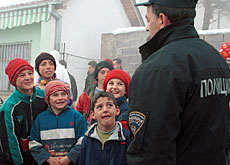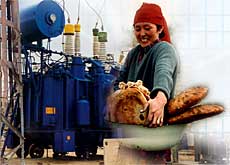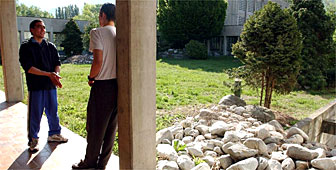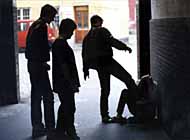Swiss advise on juvenile justice

A Swiss organisation dedicated to the rights of the child has been advising emerging democracies on how best to handle youth offenders.
The Sion based Institute for the Rights of the Child (IDE) holds seminars on how to set up proper juvenile justice systems in eastern and central Europe.
The latest seminar, held in December, brought a dozen judges from Macedonia to Sion, where they took part in workshops on dealing with juvenile delinquents, and visited Swiss young offenders institutions.
Swiss lawyer Jean Zermatten, who is director of IDE and head of canton Valais’ juvenile court, explained that a first step for many of the visiting judges and lawyers is to make a clear distinction between adult and youth offenders.
“The problem is that in Macedonia they have no specific system for dealing with young offenders,” Zermatten told swissinfo. “So they come here to learn from us.”
The lack of a proper framework for dealing with juvenile delinquents means that many youngsters who have committed relatively minor offences end up in prison with hardened criminals.
Copying not the answer
But Zermatten said that simply copying the Swiss juvenile justice system was not necessarily the best idea.
“It’s up to them what they do with what they learn here,” he said. “But I would prefer them not to copy. A better solution would be to set up their own system with some influences from Switzerland.”
One of the aspects of the Swiss judicial system which is of great interest to visiting judges and lawyers is mediation, which has become very popular across western Europe for crimes such as theft and damage to property.
Reparation
Mediation involves the victim of the crime meeting the offender, and together they agree on a form of reparation. This can be community service, or counselling, and in most cases a custodial sentence is avoided.
Keeping youngsters out of detention wherever possible is now seen as a positive step by many social workers and lawyers, who believe that prison often teaches juvenile delinquents new crimes.
Mila Kambowska, a senior judge from the Macedonian capital, Skopje, believes introducing mediation could be very beneficial in her country.
“I have worked in juvenile justice in Macedonia for 28 years,” she told swissinfo. But we are right at the beginning of things like mediation.
“I here to listen and learn from those who do have experience of it. I think it could be a great help for our country.”
Establishment reluctance
Despite the enthusiasm of the visiting judges, Jean Zermatten believes it won’t be easy for them to introduce a new legal system at home.
“I think they will have to count on meeting some reluctance,” said Zermatten. “For many establishment figures in Macedonia moving from a system geared specifically to adults to one for children will be a really radical step.
“They will have to accept that not every young offender will be penalised,” he continued. “Instead there will be new methods of treatment such as community service, and mediation, and many people will see this as a revolution.
“So it won’t be easy for our guests to change things. It will take time.”
Still, Zermatten and IDE have no intention of letting the slow pace of change discourage them in their work. The organisation has already held successful seminars for judges from Iran, and later this year, a course for magistrates from Turkey is scheduled.
swissinfo, Imogen Foulkes
IDE, with sponsorship from the United Nations Children’s Fund, Unicef, regularly holds seminars for judges and lawyers from emerging democracies and developing countries, aimed at giving advice on how to set up a fair juvenile justice system.
The seminars include talks from Swiss legal professionals, and visits to Swiss young offenders institutions.
Emphasis is placed on finding alternatives to custodial sentences for juvenile delinquents, such as mediation, community service or counselling.

In compliance with the JTI standards
More: SWI swissinfo.ch certified by the Journalism Trust Initiative



You can find an overview of ongoing debates with our journalists here . Please join us!
If you want to start a conversation about a topic raised in this article or want to report factual errors, email us at english@swissinfo.ch.